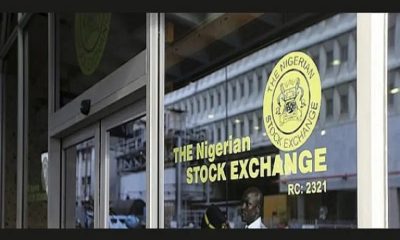Economy
Ways & Means hike: CBN may loan over N746bn to FG

The Central Bank of Nigeria may print or wire over N746bn as a loan to the Federal Government based on the Ways and Means provision of the CBN Act.
In the Act, funds that the apex bank should provide to the Federal Government through Ways and Means is five per cent of the Federal Government’s previous year’s revenue.
Last week, the National Assembly raised the maximum borrowing percentage in the Act from five per cent to ten per cent.
Data from the National Bureau of Statistics on Saturday indicated that as of the third quarter of 2023, the Federal Government’s actual aggregate revenue was N7.46tn.
Based on the hike in Ways and Means funding approved by the National Assembly, the Federal Government would get no less than N746bn from the apex bank through the funding scheme.
The Ways and Means Advances are loan facilities used by the CBN to finance the government during periods of temporary budget shortfalls and are subject to limits imposed by law.
According to Section 38 of the CBN Act, 2007, the apex bank may grant temporary advances to the Federal Government with regards to temporary deficiency of budget revenue at such rate of interest as the bank may determine.
The Act read in part, “The total amount of such advances outstanding shall not at any time exceed five per cent of the previous year’s actual revenue of the Federal Government.”
The maximum borrowing percentage in the Act was hiked from five per cent to ten per cent by lawmakers last week, as they also rescinded and re-enacted the 2024 Appropriation Act through an amendment bill sponsored by leaders of both chambers.
In the Senate, the increase in the threshold was achieved through the consideration and passage of a bill sponsored by its Leader, Senator Opeyemi Bamidele (APC Ekiti Central).
In his lead debate, Senator Bamidele explained that the bill seeks to amend the CBN Act to increase the total CBN advances to the Federal Government.
He stated that the bill aims to help the government meet its immediate and future obligations due to the increasing need for funds to finance budget deficits and other expenses.
“The Central Bank of Nigeria’s advances to the Federal Government are essentially loans that the Central Bank of Nigeria provides to the government to help it meet its financial obligations. These advances are typically short-term and are expected to be repaid by the government,” he said.
Senator Bamidele explained that the request to increase the threshold from five per cent to fifteen per cent of the previous year’s revenue was made to provide immediate funds to address budget shortfalls, finance essential government expenditures, maintain financial market stability, inject money into the economy, and support critical sectors like agriculture, healthcare, and infrastructure development.
He said this would also lower government borrowing costs compared to traditional borrowing methods.
During the debate, many Senators supported the amendment but argued that the 15 per cent should be reduced to ten per cent.
However, the Federal Government had in the past taken excessive advantage of Ways and Means loans.
The administration of former President, Major General Muhammadu Buhari (retd.), had come under heavy criticism for abusing the Ways and Means.
From 2014 to 2023, the Federal Government collected N30tn through Ways and Means from the CBN without National Assembly appropriation.
Following this, the Senate set up an Ad-hoc committee led by Senator Isah Jibrin (APC, Kogi East), to carry out investigations.
Commenting on the development, financial analysts said the CBN would have to print more cash to meet the demands for increased funds through the Ways and Means advances, pointing out that this could further raise inflation.
An economist, Paul Alaje, expressed concern over the increase in Ways and Means advances to the Federal Government from five to ten per cent.
He said the move would lead to increased pressure on the CBN to print more money, potentially affecting the economy adversely.
Another economist at Lotus Beta Analytics, Shadrach Israel, also expressed concern over the recent increase, noting that it could lead to an increase in money supply and, subsequently, inflation.
He, however, acknowledged that the current upward trend in interest rates might mitigate the effects of the increase.
Recall that the Minister of Finance and Coordinating Minister of Economy, Wale Edun, said the N22.7tn printed by the CBN through Ways and Means overdraft for the Federal Government from 2015 to 2023, under former President Buhari, threw the country into the current inflation.
Economy
Stock Market Surges: N228bn Gain Sets the Tone for a Strong Trading to Week

The Nigerian stock market opened the week on a bullish note on Monday, gaining N228 billion on the Nigerian Exchange Ltd.
Market capitalisation rose by N228 billion or 0.34 per cent and closed at N66.693 trillion compared to Friday’s figure of N66.465 trillion.
Similarly, the All-Share Index (ASI) climbed by 363.57 points or 0.34 per cent, reaching 106,116.18 from 105,752.61 recorded earlier.
The Nigerian stock market opened the week on a bullish note on Monday, gaining N228 billion on the Nigerian Exchange Ltd.
Market capitalisation rose by N228 billion or 0.34 per cent and closed at N66.693 trillion compared to Friday’s figure of N66.465 trillion.
Similarly, the All-Share Index (ASI) climbed by 363.57 points or 0.34 per cent, reaching 106,116.18 from 105,752.61 recorded earlier.
The positive trend was driven by strong buying interest in medium and large-cap stocks including International Breweries, Legend Internet Plc, Cadbury Nigeria, Fidson and more.
In spite of the upward trend, the market breadth closed positively, with 47 gainers and 16 losers.
International Breweries led the gainers’ chart, rising by 10 per cent to close at N8.47 per share.
Legend Internet Plc followed, appreciating by 9.97 per cent to settle at N7.50 per share.
Cadbury Nigeria gained by 9.96 per cent, and end the day at N29.25, while Fidson rose by 9.95 per cent to close at N20.45 per share.
Eterna also advanced by 9.90 per cent to close at N43.85 per share.
On the losers’ chart, Livestock Feeds dropped by 10 per cent, closing at N8.55 per share.
Aradel Holdings declined by 9.86 per cent to end the session at N448.00 per share
Tripple Gee fell by 9.60 per cent to close at N1.79, while John Holt Plc shed 7.94 per cent to close at N5.80 per share.
Linkage Assurance lost by 6.15 per cent, and finished the day at N1.22 per share.
A total of 500.59 million shares worth N12.110 billion were traded in 17,637 transactions.
This is compared to Friday’s 428.08 million shares worth N20.174 billion, exchanged across 14,284 transactions.
Access Corporation led the activity chart with 60.867 million shares traded, which was worth N1.45 billion.
Fidelity Bank followed with 56.105 million shares valued at N1.13 billion while the United Bank for Africa sold 34.53 million shares worth N1.174 billion.
Guarantee Trust Holding Company transacted 33.49 million shares valued at N2.181 billion and the Nigerian Breweries traded 28.336 million shares, amounting to N1.15 billion.
Economy
OPay Scam Alerts advises Nigerians to remain vigilant against dubious activities

You are just seconds away from sending money – the offer sounds perfect, the seller seems trustworthy and the clock is ticking.
But just before you hit send, one of Nigeria’s leading financial institutions, OPay flashes a critical warning: “Caution – this account has been linked to suspicious activity.”
In that moment, the rush fades, your instincts kick in, and you realise you were on the brink of falling for a scam. One smart alert, one timely pause — and your hard-earned money stays exactly where it should: safe.
This is the power behind OPay’s multi-layered scam alert system — an Artificial Intelligence (AI)-driven, real-time defense network designed to detect and stop fraudulent transactions before they happen.
At the heart of it is a machine learning engine trained on thousands of scam patterns, user reports, flagged accounts, and unusual transaction behaviors. But OPay’s approach goes far beyond a single alert.
How OPay’s scam alert ecosystem works
Abnormal Transaction Pop-Up Reminders
When suspicious behavior is detected, OPay immediately interrupts the flow with a clear, targeted pop-up message. Every day, over 60,000 users receive these urgent fraud warnings — and thanks to that, 30,000 risky transactions are stopped in their tracks.
Intelligent Outbound Call Reminders
For higher-risk transactions, OPay activates a multi-channel response, sending warnings via SMS, email, app notifications, and even escalating to customer service calls. This proactive layer reaches more than 10,000 users daily, discouraging over 8,000 fraudulent transactions.
Interactive Q&A Verification
In cases where more context is needed, users are engaged with real-time Question & Answer (Q&A) prompts to understand the purpose of their transaction. If red flags are confirmed, the system presents a tailored warning or ends the transaction flow altogether. This feature alone helps deter over 46,000 scam attempts daily from the 50,000+ users who interact with it.
Together, these layers form a real-time scam detection and prevention engine that evolves with every user interaction. OPay’s system doesn’t just warn — it learns and adapts, constantly improving its accuracy and response time.
Many users don’t even know they’re in danger until OPay steps in. As one X user, @JAHS, shared: “OPay alerted me that I might be sending money to a scammer when I wanted to patronize an IG vendor. Stopped the transaction ASAP.”
These interventions are happening silently, daily – often before the user even suspects something is wrong.
OPay’s scam alert system is part of a broader philosophy: security is not just about technology – it’s about trust. From scam alerts to Face ID transaction verification, USSD instant account locking, the Large Transaction Shield, and automated callback alerts, every tool is designed to protect users in the moments they can’t predict.
As scams get more sophisticated, the future of financial safety depends on real-time prevention. And OPay isn’t waiting for fraud to happen — it’s stopping it in its tracks. Sometimes, the smartest financial decision you make… is the one OPay helped you avoid.
Economy
States face allocation cuts as agency demands N100bn monthly

The monthly statutory allocations to state governments from the federation account may decline in the coming months following an official request by the Nigeria Sovereign Investment Authority to boost the nation’s residual funds with the support of N100bn monthly.
The request, which was presented by the Managing Director and Chief Executive Officer of NSIA, Aminu Umar-Sadiq, is aimed at unlocking large-scale investments to drive Nigeria’s economic growth.
He made the request at the March revenue-sharing meeting of the Federation Account Allocation Committee held between April 14 and 15, 2025. Our correspondent obtained a copy of his presentation during the meeting on Friday.
Umar-Sadiq appealed to the committee, which includes state commissioners of finance, to consider and approve the request, with funding proposed to commence from the March FAAC allocation.
The presentation was titled, “Activating Residual Funding for the Nigeria Sovereign Investment Authority – Unlocking Opportunities for Large-Scale Investments to Drive Nigeria’s Economic Growth.”
According to the document, the NSIA is requesting a structured monthly disbursement of N100bn from Residual Funds—revenues in the Federation Account beyond projected hydrocarbon income—to establish a Naira-based investible capital pool.
The move, the authority says, will enhance its capacity to finance critical domestic infrastructure projects.
The MD said, “The funding would position the authority as a leading sovereign wealth fund globally, promoting responsible and strategic investments for Nigeria’s economic development and enhancing its threefold mandate to build a savings base for the country, enhance the development of infrastructure, and provide stabilisation support.”
He explained that residual funds are a legitimate source of funds transferred to the authority, provided that the derivation portion of the revenue allocation formula shall not be included as part of this funding.
-

 Opinion22 hours ago
Opinion22 hours agoTHOUGHTS ON CONSTITUENTS DEVELOPMENT IN OBIO-AKPOR
-

 News17 hours ago
News17 hours agoJust in: Popular Nigerian billionaire, E-Money nabbed by EFCC
-

 News17 hours ago
News17 hours agoKing Sunny Ade’s family opens up over his whereabouts after daughter’s alarm
-

 Politics13 hours ago
Politics13 hours agoJust in: Ex- Gov Okowa accepts betraying Southern Nigeria, laments running with Atiku
-

 News18 hours ago
News18 hours agoEx-DIG,Olofu debunks online newspaper report, says ” I retired from NPF meritously after 35yrs service
-

 News13 hours ago
News13 hours agoBoko Haram Kill Mourners, Kidnap Others In Borno
-

 News13 hours ago
News13 hours agoDeputy Speaker Leads Defection of PDP Stalwart Chris Igwe, 13,000 Followers to APC In Abia
-

 Economy21 hours ago
Economy21 hours agoStock Market Surges: N228bn Gain Sets the Tone for a Strong Trading to Week





